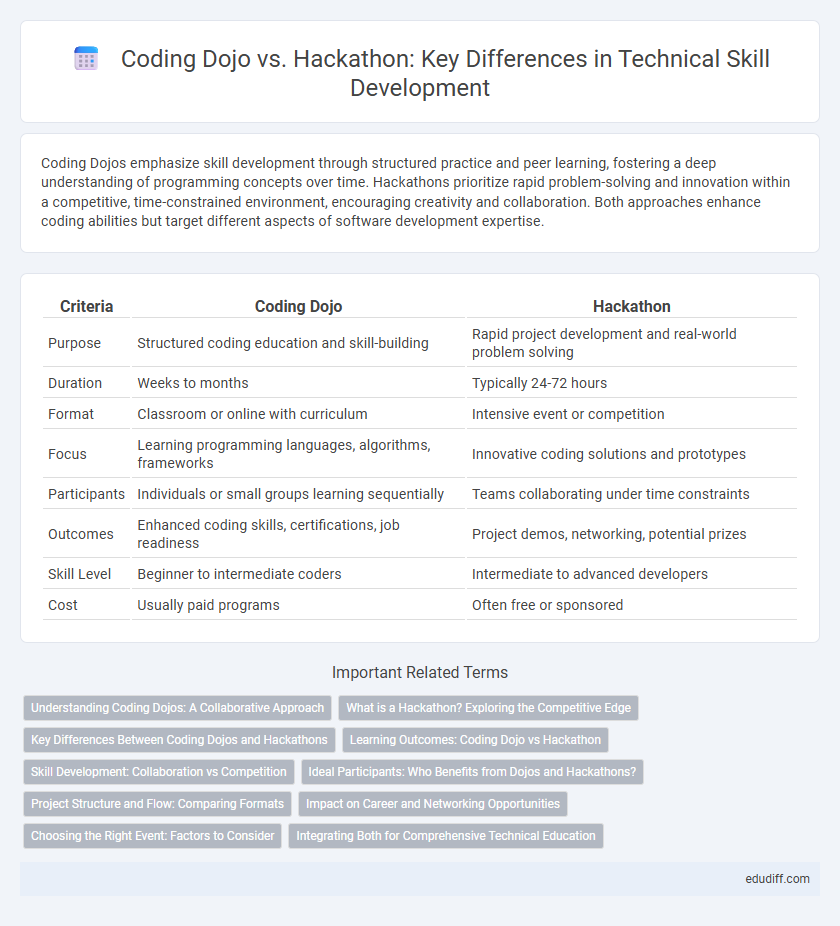Coding Dojos emphasize skill development through structured practice and peer learning, fostering a deep understanding of programming concepts over time. Hackathons prioritize rapid problem-solving and innovation within a competitive, time-constrained environment, encouraging creativity and collaboration. Both approaches enhance coding abilities but target different aspects of software development expertise.
Table of Comparison
| Criteria | Coding Dojo | Hackathon |
|---|---|---|
| Purpose | Structured coding education and skill-building | Rapid project development and real-world problem solving |
| Duration | Weeks to months | Typically 24-72 hours |
| Format | Classroom or online with curriculum | Intensive event or competition |
| Focus | Learning programming languages, algorithms, frameworks | Innovative coding solutions and prototypes |
| Participants | Individuals or small groups learning sequentially | Teams collaborating under time constraints |
| Outcomes | Enhanced coding skills, certifications, job readiness | Project demos, networking, potential prizes |
| Skill Level | Beginner to intermediate coders | Intermediate to advanced developers |
| Cost | Usually paid programs | Often free or sponsored |
Understanding Coding Dojos: A Collaborative Approach
Coding Dojos emphasize collaborative learning through structured practice sessions where developers solve programming challenges together, fostering peer feedback and continuous improvement. Unlike hackathons, which focus on rapid project development within a limited time, Coding Dojos prioritize skill refinement, knowledge sharing, and iterative problem-solving techniques. This collaborative approach enhances teamwork, coding proficiency, and algorithmic thinking by encouraging collective code review and experimentation.
What is a Hackathon? Exploring the Competitive Edge
A hackathon is an intensive, time-bound coding event where developers, designers, and project managers collaboratively create software solutions, fostering innovation and rapid problem-solving. Participants compete to build functional prototypes or address specific challenges, sharpening their technical skills and teamwork under pressure. This competitive environment accelerates learning and highlights creative coding approaches, offering a distinct advantage over traditional code learning platforms like Coding Dojo.
Key Differences Between Coding Dojos and Hackathons
Coding Dojos emphasize structured practice sessions focused on improving coding skills through collaborative problem-solving and mentorship, while hackathons are time-bound events designed for rapid development of innovative software projects. Coding Dojos prioritize learning and skill refinement over weeks or months, whereas hackathons demand intense bursts of coding under tight deadlines, often culminating in presentations or demos. The collaborative culture in Coding Dojos fosters continuous improvement, contrasting with hackathons' competitive environment that encourages creativity and rapid prototyping.
Learning Outcomes: Coding Dojo vs Hackathon
Coding Dojos emphasize iterative learning through structured exercises that reinforce coding best practices and collaborative problem-solving skills. Hackathons provide immersive, real-world project experience fostering rapid innovation, high-pressure decision-making, and adaptability. Both formats enhance coding proficiency, but Dojos prioritize skill refinement while Hackathons drive practical application and creativity.
Skill Development: Collaboration vs Competition
Coding Dojo emphasizes collaborative skill development by fostering teamwork and peer learning in a structured, multi-week curriculum, enabling participants to build comprehensive programming expertise. Hackathons drive competitive skill advancement through intense, time-limited challenges that encourage rapid prototyping and individual problem-solving under pressure. Both formats develop coding skills uniquely, with Coding Dojo prioritizing sustained collaboration and Hackathons focusing on fast-paced, competitive innovation.
Ideal Participants: Who Benefits from Dojos and Hackathons?
Coding Dojo benefits beginners and intermediate programmers seeking structured learning and hands-on practice through guided exercises and mentorship, fostering skill development in a paced environment. Hackathons attract experienced developers, designers, and entrepreneurs driven by problem-solving under time constraints, emphasizing rapid prototyping and innovation. Both platforms enhance coding skills, but Coding Dojo suits those requiring foundational knowledge, while hackathons suit participants aiming for collaborative, high-pressure creativity.
Project Structure and Flow: Comparing Formats
Coding Dojos emphasize iterative learning with small, focused exercises that reinforce specific programming techniques through collaborative problem-solving in a controlled environment. Hackathons prioritize rapid, end-to-end project development, encouraging quick prototyping and integration of diverse skills to deliver a functional product within limited time constraints. The structured flow of Coding Dojos supports skill refinement, while Hackathons drive innovation and real-world application through time-pressured experimentation.
Impact on Career and Networking Opportunities
Coding Dojos provide structured learning environments enhancing problem-solving skills critical for software development careers, while Hackathons simulate real-world challenges, fostering innovation and rapid prototyping abilities valued by employers. Participation in Coding Dojos builds consistent peer networks and mentorship connections, whereas Hackathons offer exposure to diverse industry professionals and potential recruiters, accelerating career advancement opportunities. Both platforms significantly expand professional networks but differ in pacing and collaborative intensity, influencing distinct career trajectories in tech.
Choosing the Right Event: Factors to Consider
When choosing between a Coding Dojo and a Hackathon, consider factors such as the event duration, collaboration style, and learning objectives. Coding Dojos emphasize skill refinement through guided practice and peer feedback, ideal for developers seeking iterative improvement in a controlled environment. Hackathons offer intensive, time-bound challenges promoting innovation and teamwork, suitable for those aiming to rapidly prototype solutions and network with diverse tech professionals.
Integrating Both for Comprehensive Technical Education
Integrating a Coding Dojo with Hackathon experiences fosters a comprehensive technical education by combining structured skill-building with real-world problem-solving challenges. Coding Dojos offer iterative practice in programming fundamentals and collaboration, while Hackathons cultivate innovation, rapid development, and teamwork under pressure. This hybrid approach enhances proficiency in software development workflows, promotes adaptive thinking, and prepares participants for diverse technical environments.
Coding Dojo vs Hackathon Infographic

 edudiff.com
edudiff.com